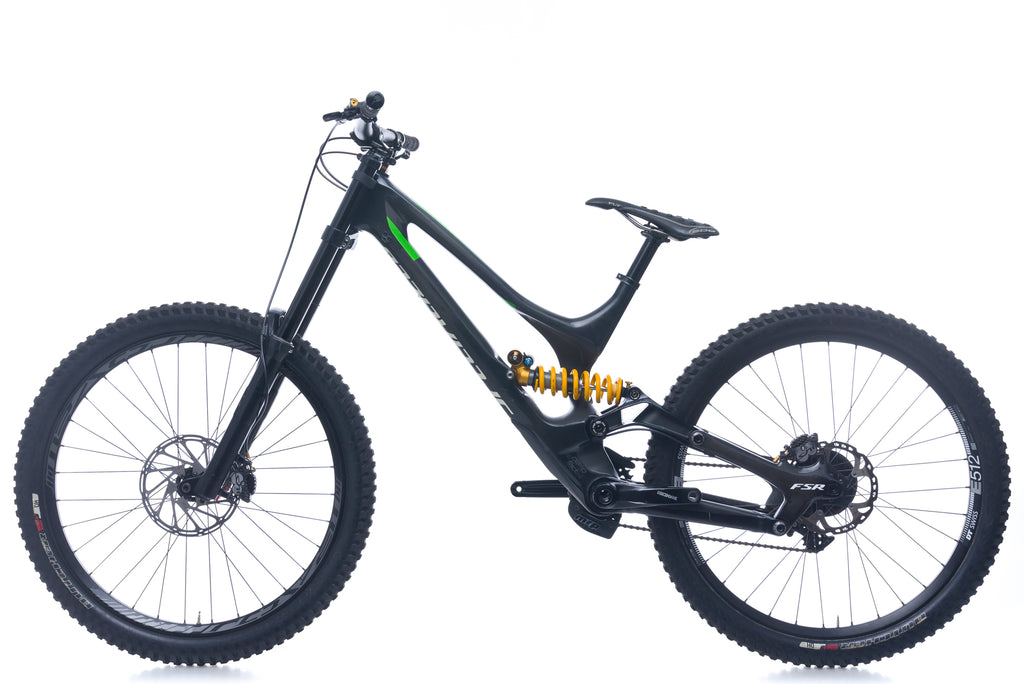![]() You don't need to be an 'investor' to invest in Singletrack: 6 days left: 95% of target - Find out more
You don't need to be an 'investor' to invest in Singletrack: 6 days left: 95% of target - Find out more
Lots of bike designs have adopted this now. The fiddly matter of getting the shove into the shock past a seat tube means that the designer's cop-out du jour is a bit of yokey hardware.
Let me throw a choice, unresearched and prejudicial term into the interwebs: "jack-knife"
It seems to me that a mountain bike shock absorber is not a thing that benefits functionally from being poked at from a distance with a wibbly wobbly stick.
Is it just me?
Examples? I need to see what I'm meant to be annoyed about...
It's just you.

Commencal Meta AM 29 : https://goo.gl/images/ypxPvW
Orbea Rallon: https://goo.gl/images/R2P2wD
Whyte S-150 / G-170 / anything: https://goo.gl/images/R7ywzU
Specialized anything: https://goo.gl/images/z1Asey
For chuff's sake, don't look up the Ploygon Xquareone. You'll shit yerself apoplectic.
Ah, ok...so the shock and swingarm are 'broken' due to the seatpost? Not an issue personally, internal routing keeps cables away from snags and a seattube allows decent adjustment of saddle...
Those ever so clever people in marketing have explained for many a model launch that side loading on the shock was a bad thing eliminated/improved for model year 20XX... and, hey, the yoke is mounted on things called "bearings".
It is like nobody believes bearings end up after a year in the mud and grime being less bearing-ey than when they're factory fresh,
My main quibble is that when a mechanism like this starts to develop play, the shock load of a quarter of a tonne (2:1 CR from 30% sag to bottom out, 2.3:1 mechanical ratio, 90kg rider, assumptions made about wheelbase and chainstay length) is acting off axis and will rapidly make things worse. If you're designing a connection to not develop play, you wouldn't turn a shock eyelet on its side, shove a bolt through and say "job done".
This is actually very helpful. My fantasy bike shortlist keeps getting shorter.
It's being tied in to a specific shock that I personally don't like about the while yoke thing. Though Sram now have a specific yoke fitting on the metric shocks I think?
the shock load ,,, is acting off axis and will rapidly make things worse.
If you think about it, the entire rear subframe is basically a shock yoke that connects the rear wheel to the shock. If the bearings connecting the rear subframe to the rest of the bike develop play, then you will get side loadings on the shock. The length of the yoke itself is just a distraction.
Also, it doesn't seem to be a big issue in real life.
The most stable shock for what your worried about is a pull shock. But no ones currently making one that I know of. I’ve got a Cannondale trigger with a pull shock and a rallon with a yoke’d push shock and I can tell the difference in the rear shock mounts from the feel of the two bikes.
I had a process 153 with such a yoke from late 2013, until xmas last year.
Did a couple of ews, Megavalanche, several UKGE series, many a wet Welsh Weekender etc etc.
Went thru 2 sets of bearings & 1 set of shock seals ( +1st SRAM shock had to go back under warranty after a few months but fox replacement was much better)
Which is perfectly reasonable imo, especially as I'm not light & lack finesse.
It wasn't a proprietary shock mount either, so no probs there
OP my experience doesn't match your theory
It is becoming clear that I am alone in this.
Yeti have just launched a whole series of bikes where their take on this bodge is being touted as a feature and it is possibly the ugliest implementation yet: https://goo.gl/images/2VV1Rn
This one is utter nonsense. Why have two narrowly spaced bearings supporting two separate pieces. The structure is only held together by a threaded bolt but they've built in a mechanism where any flex will provide counterrotation of the two ends. I predict these will work themselves loose and otherwise creak and be annoying. Sticking plaster solution. The engineering justification in an extension being required in that their design is that it maintains their desired kinematics as it moves the shock higher in the frame (weren't shocks low down in the frame supposed to be good for handling) so that a water bottle can be fitted. The implementation, given that problem, is a farce.
At least Pivot have the decency to hide theirs out of sight: https://photos.app.goo.gl/z1paqV6QeaYrrLJw5
And YT have the nous to not need one and eliminate most friction causing rotation at the shock by just having the seatstays drive the shock ( I wonder if their renowned super-progressive characteristics are related to this: https://goo.gl/images/id5swL
I concede. It is just me.
Why have two narrowly spaced bearings supporting two separate pieces.
It reduces problems caused by misaligned frames.
If you think it's ugly, don't buy it. Why would it work loose or creak any more than other designs?
Would a hardtail help?
Looking at it from a purely functional point of view, the seat tube is between the shock and the other elements of the rear triangle. So, given that you're going to need to connect the shock to one or the other of those elements you can either use some sort of yoke/shuttle or you can extend the elements beyond the seat tube directly.
Is one solution really better than the other?
Would a hardtail help?
I think only a rigid steel fixie would meet the required standards of elegant simplicity. Or maybe a unicycle, after all, a front wheel is just an ugly bodge to compensate for poor balance and coordination and all those bearings in the headset just creak and cause problems.
>So, given that you’re going to need to connect
>the shock to one or the other of those elements
>you can either use some sort of yoke/shuttle
>or you can extend the elements beyond
>the seat tube directly.
Or you pull it's pants to one side.

A lot of this is because of trying to fit a bottle and a piggyback shock within the frame whilst achieving a decent leverage curve.
It is becoming clear that I am alone in this.
Nah I think they are stupid too. (Mainly because I have to deal with the creaks and scored damper shafts)
Or you pull it’s pants to one side
Vivid imagery. Chapeau.
Agreed, that Yeti looks like a poor design...doesn't look right at all.
Re "tied to a particular shock" -some of them yokes look like they attach to a standard shock-end. Anyone got such a bike and can say if this is the case?
some of them yokes look like they attach to a standard shock-end. Anyone got such a bike and can say if this is the case?
That's the case on my orbea rallon.
The Whyte ones I have worked on use a normal shock

Whereas some need a specific shock (bolts into the end), Bike Yoke do some adapter yokes to run normal shocks.

I also have a Kona Process 153 of 2014 ilk and it's fine yoke has not exploded and killed any baby robins. Armchair engineers with their pseudo engineering shouldn't worry so much.
Let me correct your post for you:
I also have a Kona Process 153 of 2014 ilk and it’s fine yoke has not exploded and killed any baby robins.[Post ends]
The new 2019 Stumpjumpers come with a standard shock on the yoke now too.
Why the downer on free speech @peaslake?
Derogatory slur on people holding a counter view as any fule kno.
"We've had enough of experts" is how Brexit happened. Look you made me bring up Brexit?!
Blue yolks for all!
The Orbea Occam comes with a yoke
https://brilliantbikes.co.uk/orbea-spares/2934-orbea-occam-shock-extender-pivot-kit.html
Although I think it is a good idea, the flaw in the design is that the shock is fixed with a bolt that screws into a tapped fixing in the yoke. The problem with this is that there is a bit of clearance in the bolt shaft near the socket head, which allows the bolt to rock about the thread when loaded and unloaded, causing an anoying creak. It would do better to get rid of the tapping and provide a nut instead, so the bolt is equally supported at both ends of the yoke.
I think that the more recent but similar Rallon linkage design may have addressed this.
An armchair engineer earlier today

pull its pants to one side.
Or go crotchless

disappointingly, for the integrity of the joke, the frame has more crotches than a frame without the hole. No crotched yoke, though. Nice to have a choice of crotches.
pull its pants to one side.
No need if you have a crotchless frame.
Or just reach under...

If the shock is mounted directly to the rear end, then the distance from the bearing to the shock is likely to be much greater, which would amplify any play and increase side loading on the shock. Look at the GT sanction above, that rear shock mount must be 200mm away from the bearing which attaches to the same part of the bike as the front shock mount. 1 degree of play would be much more serious (4x to be exact) than in the Whyte shown higher up (for example), where the rear of the shock is only about 50mm away from the bearing attaching it to the front triangle.
Amongst the shock attachments there are:
1. Yoke
2. Pointless twin half yokes (Yeti SB(metric))
3. Attach to linkage (guarantees rotation and hence friction unless countered with a roller bearing (old style) or bearing trunnion mount (contemporary), the "Reach under" Ancillotti Scarab Evo a special case of that as is the Pants Spesh Demo
4. Attach to two linkages to get double the friction (Mondraker, Trek full floater (with extra cantilevering of welded aluminium fabrications))
5. Drive direct from rear triangle / seatstays / horsty bit (YT, Yeti SB(imperial), 1st gen Devinci Spartan) and Crotchless as a special case of that
The direct attached option 5 definitely comes with the potential for side loading the shock but we also see implementations where the seatstays / horsty bit are stabilised to the frame by a robust link (YT, 1st gen Spartan)
The attach to linkage thing seems to be the pragmatic alternative, with the clever solutions addressing the friction issues.
When yokes are attached to coil shocks it is truly horrifying (because that big beefy coil doesn't do anything to stabilise the shaft on its axis). You just have a long bendy buckly flopfest aiming to push a skew aluminium shaft through a skew sealhead.
I'm guessing the next enduro bike I buy will be a 3. (because they're everywhere and are guaranteed yoke free) or a YT (because nobody else seems to be doing 5.s these days)